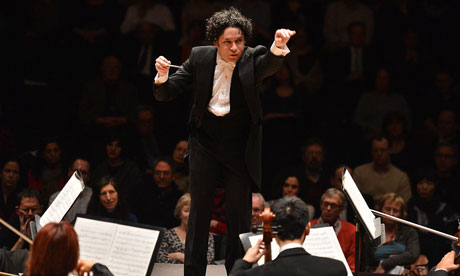
This year's Los Angeles Philharmonic residency at the Barbican will doubtless be best remembered for its focus on new music and a series of important premieres by John Adams, Unsuk Chin and Joseph Pereira.
The final concert marked a return to established classics, with Debussy's La Mer and Stravinsky's Firebird both featured. Even here, though, Gustavo Dudamel's commitment to new music was evident in his decision to open the evening with Zipangu by Claude Vivier, the Canadian-born composer who was murdered, aged 35, by a male prostitute in Paris in 1983.
Zipangu was the name given to Japan by Marco Polo, and Vivier, much travelled in Asia, deploys a string ensemble of 13 players to evoke an austere, ritualised world by means of shifting colours and drones.
There's a gradual accumulation of protracted dissonances and a weird, climactic double-bass solo, in which time and rhythm seem to stand still amid a sequence of throbs in the instrument's highest registers.
It's much too long – Vivier didn't seem to know when and how to end a piece – but you couldn't help but be impressed by the players' dexterity and Dudamel's commitment.
Dudamel used a score for Zipangu, but then conducted La Mer and Firebird from memory. La Mer glared a bit, and was short on poetry in its first movement. You couldn't fault the playing, though the orchestral textures were too dense for my taste.
Firebird, on the other hand, was astonishingly beautiful. Dudamel primarily views the work as post-Romantic – an expansion and elaboration of traditions established by Tchaikovsky and Mussorgsky, rather than a proto-modernist new departure. His speeds were measured, which made the opening very sensual and the Kastchei scenes very intense. The orchestral sound was ravishing from start to finish.
• What have you been to see lately? Tell us about it on Twitter using #GdnReview

